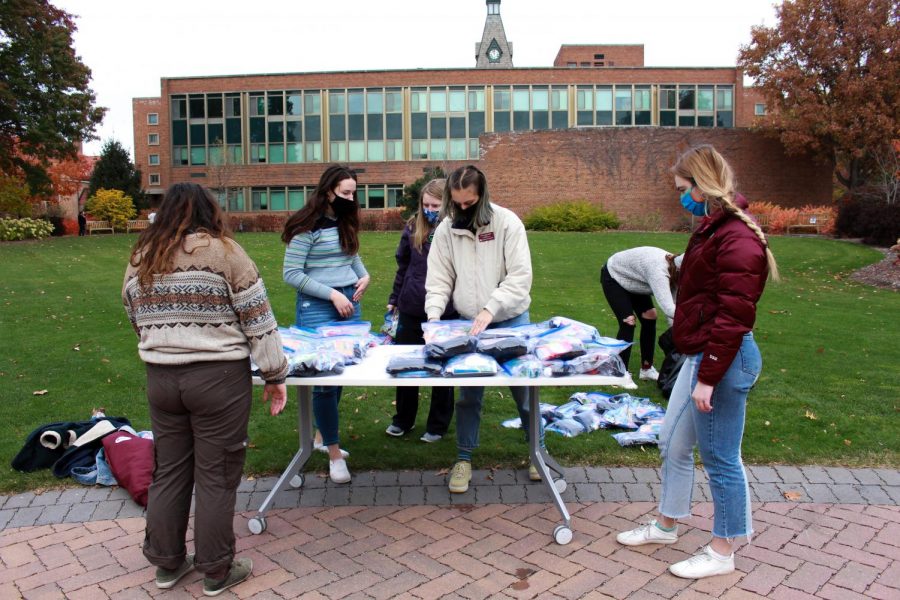A helping hand for the homeless
Hamline students are raising awareness about homelessness in the Twin Cities.
October 28, 2020
Homelessness is one of the countless issues that have been exacerbated by the current pandemic, and two Hamline student organizations are working to raise awareness to help their communities.
The Hamline Outdoor Recreation Club (HORC) and the Hamline Programming Board (HUPB) joined up for a collaborative event focused on the concept of mutual aid and raising awareness around the issues facing those without houses.

Juniors Hannah Pickering, Amanda Libby, Christina Talberg, Emma Harrington and senior Brianna Olson set up to distribute mutual aid kits. Students were encouraged to carry kits with them, especially in cars, to hand out to those asking for money.
The event was spearheaded by junior Emma Harrington, the HUPB Collaborations Programmer, who became engaged with the topic on social media over the summer.
“After the murder of George Floyd, a lot of social media became activism. I began to learn about mutual aid,” Harrington said. “I just thought, I’m a member of the community and I want to help in whatever way I can.”
Harrington reached out to activist @niquiTina on Twitter and Instagram working with the unhoused community in the Twin Cities and asked what she could do to help. Soon, she was getting others involved in mutual aid.
“Mutual aid is essentially the collective sharing of resources for everyone’s wellbeing as a community,” Harrington said. “One of the foundational beliefs is solidarity not charity, so it’s about working with people.”
As a member of the HUPB, Harrington started to look for ways to involve other Hamline students, and began with friends that she had in HORC.
Senior Brianna Olson was one of these friends who helped Harrington host the event which consisted of an educational portion held online and an opportunity afterward to pick up kits that held useful items for people who might be living without houses.
“The idea is that if you have a car, or know someone who has a car, you can keep [the kits] in there and if you see someone in need you can give them that,” Harrington said. “Not everyone will want that, but just in case.”
One of the key aspects of the educational portion was about the importance of respect and assistance when helping people who are experiencing homelessness.
“When you are thinking about participating in mutual aid, you have to be mindful. Think about what you would want and how you would want to be treated,” Olson said. “Ask people what they need instead of just assuming.”
Much of the unhoused population in the Twin Cities live in tent encampments, often in city parks. During their trips to homeless encampments, Harrington and others have helped with chores, provided meals and even helped inhabitants move when they were being evicted from the park they were living in.
“You have an idea of how it will be, but to actually see it,” said junior Amanda Libby. “They’re people, their tents are their homes and when they get evicted all of their belongings [can be] taken.”
For everyone involved, this hands-on work has been a learning experience. The unhoused population in the Twin Cities has been increasing over the past years — according to the Wilder Foundation which tracks these numbers — and the pandemic has put new stress on these communities.
For those who are interested in helping, Olson stressed that there were many ways to do this.
“You don’t need money to help,” Olson said. “If you are interested volunteering or learning a little bit more, definitely feel free to reach out to us.”
Both HORC and HUPB are happy to help any students interested in learning more about mutual aid. Students can reach out to their emails, horc@hamline.edu and collaborations-hupb@hamline.edu, with any mutual aid event ideas or questions on how to get involved. They also shared other well-established groups supporting the unhoused, including @STPCampsHub and @TCparkresponder on Twitter.
“We are just Hamline students and sometimes it takes a little courage to reach out and get connected with people,” Harrington said. “But once you do, it’s a really great way to help. There are always needs to be met.”
